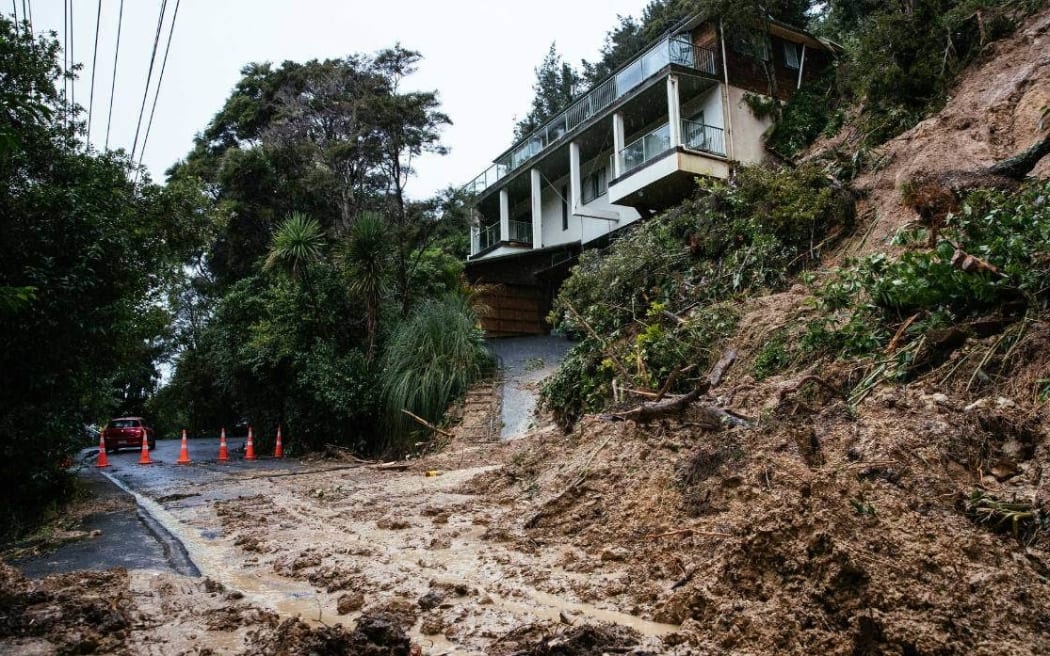
Premiums would become unaffordable in high-risk areas. Photo: Stuff / Abigail Dougherty via LDR
The Insurance Council has been meeting in Auckland this week to discuss the challenges and risks around climate change.
Speakers agreed that moving away from flood-prone areas would be necessary to reduce risk and prevent insurance becoming unaffordable.
But opinions were mixed on whether a buy-back scheme for homes in such areas would work.
Insurance Council chief executive Tim Grafton opened the conference, saying insurers were worried that premiums would become unaffordable as climate change accelerated, especially for homes in vulnerable areas.
"Looking back 12 months ago, in the aftermath of the Auckland Anniversary weekend floods and Cyclone Gabrielle, it is no surprise that the themes of resilience and affordability are the bookends of this conference," he said.
Cyclone Gabrielle was front of mind again when Forest and Bird's Tom Kay described watching river levels rise in Hawke's Bay.
He was observing the storm from Wellington - but his family were just 600m away from the river.
"The flow gauge failed, the river kept rising, and by 10am people in the suburbs nearby were being told to evacuate, including at the top of the image there in Taradale, my family. The river was spilling out into the streets."
Victoria University of Wellington professor of public policy Jonathan Boston said natural hazards such as earthquakes and extreme weather events made New Zealand an extremely risky place.
Climate change would exacerbate that risk - especially as the globe closed in on 1.5 degrees of warming.
"Climate-related risks are clearly increasing globally and locally, and the outlook for the rest of the century and beyond is nothing short of grim."
Hastings District Council chief executive To'osavili Nigel Bickle said the region still had a decade of recovery ahead of it.
The very land Hawke's Bay was built on put it at risk, he said, and previous planning decisions were now causing problems.
"My region - and I'm sure your regions - is littered with examples of things that should never have been built."
"The place that we live - it's actual formal name - is the Heretaunga flood plains. It was created from centuries of mighty rivers flooding."
That flooding had created livelihoods from arable soil - but it also put the community at risk.
Tom Kay advocated for a nature-based solution, by moving communities further away from rivers.
He said allowing space for rivers to rise and fall was a better long-term solution than large stop-banks, with communities directly on the other side.
Minister for Commerce and Consumer Affairs Andrew Bayly said the government could help council planners to make more responsible decisions.
"The role of government in this case is actually making sure that councils don't do stupid stuff. Don't allow houses to be built on coastal areas. Don't allow houses to be built on floodplains that we know flood."
The Minister floated the idea of a national policy statement to stop building going ahead in risky areas such as floodplains.
"Often what happens is that we pass a piece of legislation and it ends up getting interpreted differently at the council level. So doing a NPS is the easiest way to do that," he said.
Meanwhile, Insurance Council of Australia chief executive Andrew Hall suggested a managed buy-back for homes in risk-prone areas.
"We've gotta have these programmes ticking quietly along in the background in the dry years, when you don't have the community stress happening. When people aren't in that emotional state of having lost everything."
But Insurance Council president Amanda Whitting said a buy-back scheme would not be easy to implement.
"If we're going to do all these things, we all have to accept that some will be winners and some will be losers. That might be ... higher [premium] rates; it might be going as far as actually being moved from your home."
The conference heard that more half of insurers here and in Australia were seeing increased demand for climate-specific coverage.
And 93 percent of insurers had already made moderate to transformative adjustments in response to climate change.
Delegates left the meeting united in getting to the heart of the problem - finding ways to move people away from risk-prone areas.



